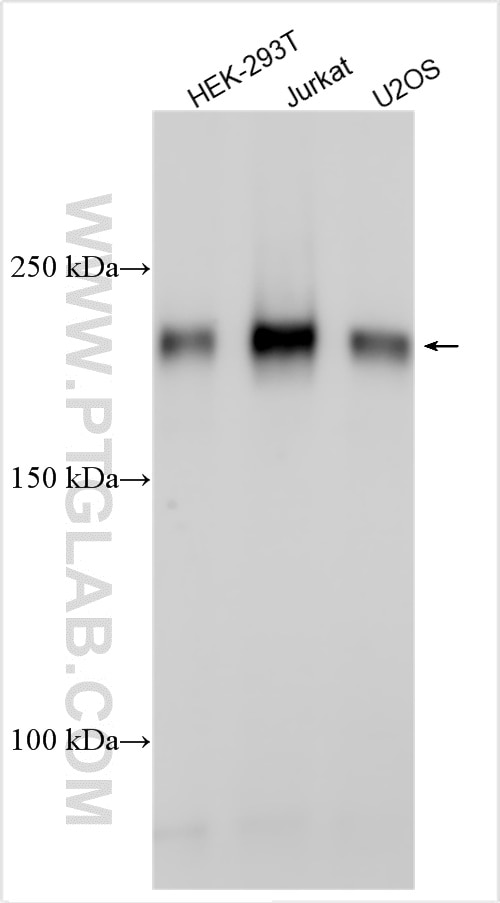ASXL2 Polyklonaler Antikörper
ASXL2 Polyklonal Antikörper für WB, ELISA
Wirt / Isotyp
Kaninchen / IgG
Getestete Reaktivität
human
Anwendung
WB, ELISA
Konjugation
Unkonjugiert
Kat-Nr. : 27229-1-AP
Synonyme
Geprüfte Anwendungen
| Erfolgreiche Detektion in WB | HEK-293T-Zellen, Jurkat-Zellen |
Empfohlene Verdünnung
| Anwendung | Verdünnung |
|---|---|
| Western Blot (WB) | WB : 1:500-1:2000 |
| It is recommended that this reagent should be titrated in each testing system to obtain optimal results. | |
| Sample-dependent, check data in validation data gallery | |
Produktinformation
27229-1-AP bindet in WB, ELISA ASXL2 und zeigt Reaktivität mit human
| Getestete Reaktivität | human |
| Wirt / Isotyp | Kaninchen / IgG |
| Klonalität | Polyklonal |
| Typ | Antikörper |
| Immunogen | ASXL2 fusion protein Ag24402 |
| Vollständiger Name | additional sex combs like 2 (Drosophila) |
| Berechnetes Molekulargewicht | 154 kDa |
| Beobachtetes Molekulargewicht | 154-230 kDa |
| GenBank-Zugangsnummer | BC042999 |
| Gene symbol | ASXL2 |
| Gene ID (NCBI) | 55252 |
| Konjugation | Unkonjugiert |
| Form | Liquid |
| Reinigungsmethode | Antigen-Affinitätsreinigung |
| Lagerungspuffer | PBS with 0.02% sodium azide and 50% glycerol |
| Lagerungsbedingungen | Bei -20°C lagern. Nach dem Versand ein Jahr lang stabil Aliquotieren ist bei -20oC Lagerung nicht notwendig. 20ul Größen enthalten 0,1% BSA. |
Hintergrundinformationen
ASXL2 is an epigenetic regulator associated with various tumors including colorectal cancer, breast cancer, and myeloid leukemia. ASXL1, ASXL2 and ASXL3 are human homologs of Drosophila Asx (Additional sex combs) and function as epigenetic regulators through recruitment of Polycomb group repressor complexes (PRC) and Trithorax group activator complexes. ASXL proteins can interact with BAP1, NCOA1, EZH2, WTIP and nuclear receptors, which suggests diverse functions of ASXL family members in epigenetic and transcriptional regulation. (PMID: 30093396, PMID: 34692512)
Protokolle
| PRODUKTSPEZIFISCHE PROTOKOLLE | |
|---|---|
| WB protocol for ASXL2 antibody 27229-1-AP | Protokoll herunterladen |
| STANDARD-PROTOKOLLE | |
|---|---|
| Klicken Sie hier, um unsere Standardprotokolle anzuzeigen |


